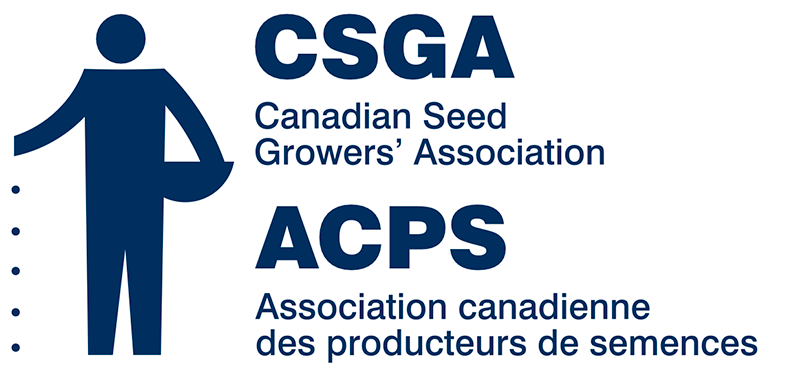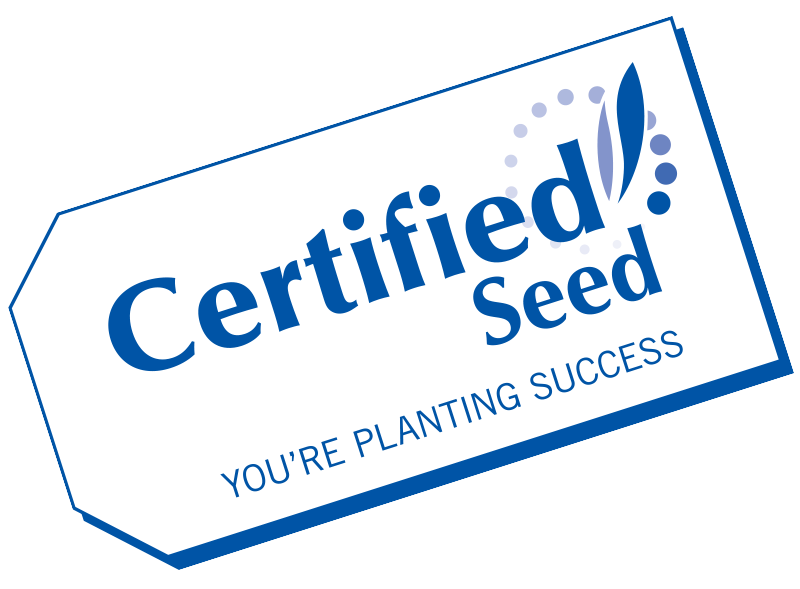Seed Grower FAQs
Q. I would like to access my CSGA online account but don’t have a password. How do I get one?
A. CSGA members without an online password can contact the CSGA office by email to request a temporary password. The password assigned to you can then be changed online after you’ve logged into SeedCert on the CSGA website.
Q. How can I find out if my crop has been inspected and whether it passed inspection?
A. Members should login to SeedCert to view the status of their seed crop inspections.
Q. Can I check my account balance online?
A. Yes, members can check their account balance in SeedCert
Q. What are the deadline dates to apply for seed crop inspection?
A. Different crop kinds have different crop inspection application deadline dates. Applications must be received at the CSGA office by the following deadline dates:
- May 5 for winter canola/rapeseed
- May 25 for fall seeded cereals
- June 10 for fababeans, forages, flax, canola, mustard, corn, and field peas
- June 20 for all other crops not listed here
- July 10 for field beans and buckwheat
- July 25 for soybeans
For more information, please go to the application webpage.
Q. I did not receive a crop inspection application package. What should I do?
A. CSGA members can complete an Application for Seed Crop Certification online by logging in SeedCert. New members can use our online form to create a SeedCert account to access this application or can contact the office by email, phone at (613) 236-0497 or fax at (613) 563-7855 to request an application.
Q. How do I find pedigreed seed for sale?
A. A listing of pedigreed seed for sale in Canada is maintained at seedlocator.net. You can also contact your local agricultural supply retailer or seed distributor.
Q. I’m moving or have changed my email address. How do I update my contact information?
A. Members can update their contact information by logging in SeedCert. You can also update your contact information by contacting the CSGA office.
Q. I’m interested in producing Certified seed. Where do I start?
A. We have an entire webpage explaining how to get started, click here.
Q. How do I become a member of the CSGA?
A. Individuals become members of the Canadian Seed Growers’ Association (CSGA) by sending in an Application for Seed Crop Certification and Membership in the Canadian Seed Growers’ Association. Membership fees are $240 for the first member on an account, and $25 for each additional grower on a group account. Membership in the CSGA must be renewed annually.
Q. Where can I find the regulations to produce Certified seed?
A. Canadian requirements and procedures to produce pedigreed (certified) seed are available here.
Q. I would like to be kept up to date on CSGA and seed sector news. Who should I contact?
A. Seed Scoop is CSGA’s electronic news bulletin. To join the distribution list, please email us. The CSGA website is also a good resource for news updates. Visit the News, and Seed Scoop webpages for additional news on the CSGA and the seed sector.
Q. Can I use the CSGA logo in my pedigreed seed marketing?
A. Absolutely. Contact our Manager, Communications and Engagement via email for more information and to obtain digital files.
Q. What is Common and bin run or farm-saved seed?
A. Common seed is a recognized grade in Canadian Seeds Regulations, with mechanical purity and germination requirements that must be met, including grading and labelling with a proper tag. Most of the standards for Common seed, such as purity limits for weeds and other crop kinds, are less than those for Certified seed. Since Common seed has no third-party or official certification records to verify varietal purity & identity, it cannot legally be sold by variety name. Bin-run or farm-saved seed is commercial grain that has usually been cleaned by farmers for replanting.
Q. Is Certified seed more expensive than bin run or farm-saved seed?
A. The cost difference between Certified seed and bin-run or farm-saved seed is a function of multiple factors. When comparing bin-run seed costs to Certified seed, consider the “hidden” costs of keeping bin-run seed compared to the yield, quality and purity advantages of Certified seed. Hidden costs may include:
- Opportunity cost of losing grain sale value
- Storage and interest
- Trucking to seed cleaner
- Trucking back to farm
- Labour (loading, unloading, management)
- Shrinkage/clean-out
- Seed testing: for germination and diseases such as fusarium
Cost differences will vary geographically by crop and by the variety selected for comparison. So, it is important to consider all the benefits of Certified seed versus just the retail price of Certified seed.
Q. I’ve been using my own farm-saved seed for years, why should I invest in Certified seed?
A. If you invest in Certified seed, you’re not just getting a proven, quality product – you’re putting money back into the research and development of new and advanced seed varieties. This brings value to your farm, gives you more choices, generates jobs in agriculture and stimulates the Canadian economy. We invite you to visit the #ChooseCertifiedSeed website.
Q. How is Certified seed different than Common or bin-run seed?
A. Common seed or bin-run seed is produced without any officially recognized third-party inspections to confirm varietal purity, identity or quality, whereas Certified seed undergoes rigorous oversight during production, harvesting and conditioning. Certified seed must pass inspections by accredited personnel as a crop in the field and again as seed at testing labs and seed cleaning establishments to ensure that it meets CSGA and CFIA requirements for varietal identity, germination and freedom from impurities.
Certified seed offers:
- New improved genetics:
Better yields; pest and disease resistance; drought, salinity and herbicide tolerance; and improved nutritional profiles and end-use qualities – those are just a few of the traits found in Certified seed, made possible by years of research and development. - Quality assurance – guaranteed:
Officially recognized third-party field and registered seed establishments mean all quality assurance requirements are met and your seed is exactly what you expect. - Clean seed:
Every Certified seed lot undergoes stringent production requirements and has a Certificate of Analysis from a CFIA-accredited lab to prove it meets federal Seeds Regulations limits for weed seeds and other crop kinds. - Varietal purity:
Certified seed production involves equipment sanitation and product segregation systems to maximize genetic purity – making sure you get the variety you want. - Future Seed Innovation:
Your purchase of Certified seed gives seed variety developers the confidence to continue to invest in research and develop new and improved seed varieties. - Maximum use of other inputs:
Certified seed offers you the best genetics and cleanest fields so you can make the most of your input dollars. - Access to new opportunities:
When end-users are looking for specific varieties for their identity-preserved (IP) products, the benefits/advantages of Certified seed can open the door to new opportunities and increased sales. - Substance behind your word:
The blue tag is your proof – grain buyers know they’re getting exactly what you say when they see the blue Certified seed tag. - Access to premium markets:
Do you want more than higher yields from your crop? Using Certified seed is your ticket to premium markets like tofu soybeans or high oleic canola. - Traceability:
A quality assurance system means Certified seed is traceable from day one – peace of mind in a marketplace that values food safety and traceability from their input suppliers.
Q. What is the process for developing certified/pedigreed seed?
A. Certified/pedigreed seed is seed that has been inspected and has received a crop certificate from the CSGA. Inspection includes review of previous land use restrictions, minimum isolation distances and crop purity.
There are five (5) classes, or generations, of seed for the certification of self-pollinated seed crops: Breeder, Select, Foundation, Registered and Certified. All classes are rogued for off-types and other varieties to meet the maximum impurity standards for their class. The standards for all classes are outlined in Circular 6.
Growers are responsible for submitting inspection applications to CSGA, sanitizing equipment, segregating varieties and roguing impurities from seed crops.
CSGA appraises applications, sends them to authorized crop inspectors who audit and inspect crops and return inspection reports to CSGA for appraisal.
If crops meet CSGA standards, a CSGA crop certificate is issued and the crop, with its varietal purity and identity verified, is considered a pedigreed seed crop. At maturity, the crop is harvested.
Pedigreed seed is then tested for compliance with the germination and physical purity standards in Canadian Seeds Regulations and can only be labelled with a variety name and an official Certified blue tag by CFIA-Accredited Graders if accompanied by a CSGA crop certificate. To audit certification, several thousand samples of pedigreed seed, including Certified seed, are annually submitted to the CFIA for official variety verification testing.
Q. What is the technical definition of Certified seed?
A. Certified seed is the product of the final generation of inspected seed crops produced by CSGA seed growers for sale to farmers to plant their commercial crops of grains and oilseeds.
Q. What is pedigreed seed?
A. Pedigreed seed, from which Certified seed is derived, is seed that is pure. In other words, it is a true-to-type seed of a known variety that has been developed for a specific purpose. ‘True-to-type’ means all the improved characteristics and benefits developed by the plant breeder have been preserved by pedigreed seed growers and verified by officially recognized third-party certification, as pedigreed seed is multiplied from the small amount developed by plant breeders through the different stages, to Certified seed stage where it can be used for commercial production.
Q. How do I know I am buying Certified Seed?
A. Look for the official Canada Certified grade name, usually on a CFIA Certified blue tag. Most seed-producing countries, including Canada, have laws that permit only Certified seed lots grown and planted according to the regulatory requirements for varietal purity and identity, germination and freedom from impurities to be tagged with the Certified blue tag from an official seed inspection agency.
Q. I still have questions. Who should I contact?
A. We are always here to help. Feel free to contact us by using our online chat feature, email, or telephone at (613) 236-0497. Our office is open between 8:00 a.m. and 4:00 p.m. EST. A complete listing of our office contact information is available online.
Q. Where can I find out more about Certified seed?
A. Contact the Canadian Seed Growers Association and we’ll put you in touch with the resource appropriate for your production needs.
Still have questions? Send in a question via email. CSGA will answer your question as soon as possible.







